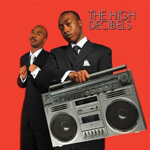|
|
 |
Dusted Reviews
Artist: The High Decibels Album: The High Decibels Label: Rolling Jack Review date: Jan. 15, 2009 |

|
|
|
 |
The High Decibels’ self-titled debut is further proof – as if any more were needed in our forty-third president’s final days – of the gap between idea and action. That grandly swinging sentence was a cheap shot, I know. But as we usher in a new era of what has been promised, and what we can only hope to be one of pragmatism, it seems fitting to consider the High Decibels by a single metric: does the music work?
Of course, that’s a loaded, probably circular question; disentangling its full meaning, much less complete answer, is beyond the scope of this review and capabilities of this reviewer. There are two points about which we can be certain, however. The High Decibels are a wonderful band in principle, a duo whose blend of slide-guitar playing and headstrong rapping should be equally novel and engaging. Performance is a separate matter. On High Decibels, the group’s signal contribution, they explore the intersection of hip hop and classic blues without a lot of success. Indeed, what this album shows most clearly is how difficult it is to bridge these two genres and generations of African American music.
Hip hop has been less transparent about its descent from the blues than from other African American sources. The Native Tongues collective obsequiously invoked post-bebop jazz to connect their consciousness rhetoric to a high watermark of black musical sophistication; the influence of funk, by contrast, is underlined each time a producer samples James Brown’s grunt and yowl. For whatever reason, the blues has not enjoyed the same encomiums.
We’ve recently seen this change at the margins, especially as the balance of power in hip hop has shifted to the South’s slower rhythms and laconic euphemisms. But traces of the blues in Southern hip hop are often vestigial – they’re in its DNA and not its physiognomy. Oakland’s High Decibels, by contrast, bring the blues front and center. KC Booker’s guitar is the fulcrum on which the High Decibels balance. He favors powerful riffs played electrically, as on the raucous opener “Miss Cindy,” or acoustically, as on “Eye of the Storm” or “No Peace in the Street.” On the other hand, Duke the Bossman, the High Decibels’ MC, is no bluesman. He comes from the tradition of the spoken word, rapping his long and snaking couplets with celerity; Duke’s words are as quick and metronomic as a jump-roper’s hops.
Playing hip hop with live instruments isn’t unique, but using the instruments to do something more than mimic hip hop’s programming is unusual. In fact, describing the High Decibels as a hip hop act seems overly limiting. Their sound is one that seems outside the genre’s strict rules. Booker and Duke are either anticipating something ahead of our time or are picking up on threads that were previously left to fray. Likely, it’s the latter; if there is a predecessor for High Decibels, it is the Beastie Boys’ Paul’s Boutique, the LP that showed the fluidity possible in Rick Rubin/Def Jam’s troglodyte rap-rock-ism. High Decibels is conceptually in step with Paul’s Boutique insofar as the two push boundaries by mixing and matching. But unlike that classic, High Decibels does not break walls; it bounces off of them.
The primary problem about the album is that it’s incomplete. It’s true – and commendable – that the duo incorporates live musicianship to an end that is something more than Questlovian copy. But there’s a contradiction in Booker’s genre-transcending guitar and the repetitious way in which he plays it. The absence of any improvisation is striking, and Booker’s ad infinitum loops seem like a waste of talent for the sake of committing to hip hop’s sampling modus operandi. It’s inconsistent and a bit baffling that Booker and Duke would defy one genre convention but unquestioningly accept another. This is, in the end, High Decibels’ most troubling aspect: the two haven’t followed through to their full conclusion.
The other criticism is similar but without the same overarching implications: Duke the Bossman’s underwhelming rapping. Like many an MC, he has one mode of delivery; and, like many an MC, his performance, despite its exuberance, drags after more than ten minutes of listening. The inflexibility of his style stands in unflattering contrast to Booker’s versatility. Too often, High Decibels suggests that Duke is not listening to his counterpart but carries on as his gut dictates. More deference from the MC – and less deference to hip hop’s rules – is in order.
By Ben Yaster
|







